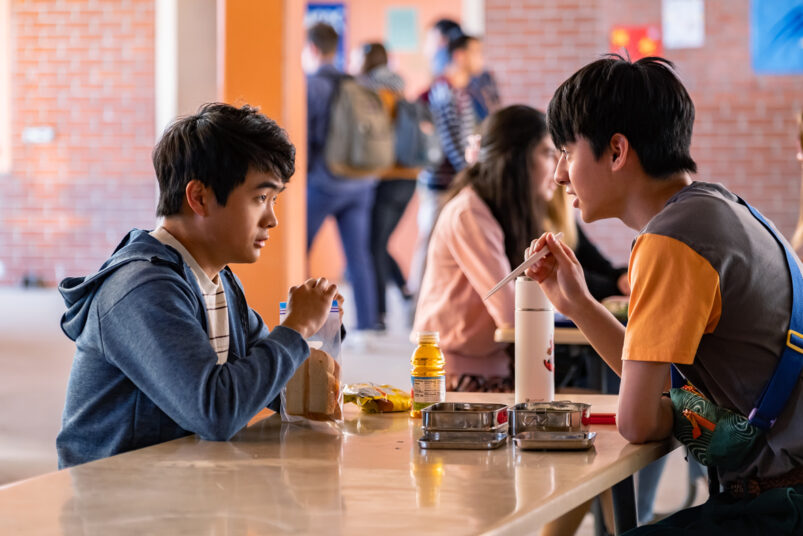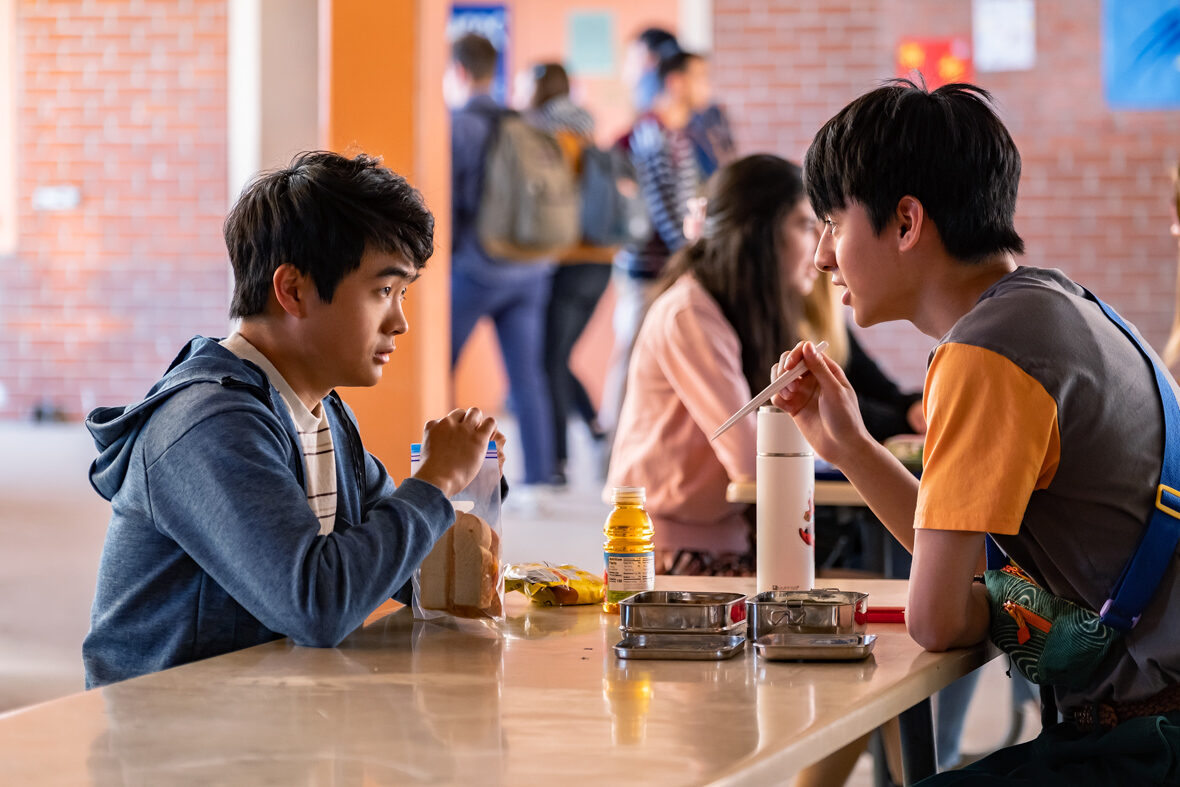American Born Chinese is an adaptation of the graphic novel by Gene Luen Yang. The series aims to coalesce two narratives. The first involves Jin (Ben Wang), who just wants to be a normal kid in school, not the Asian kid. The second involves the Monkey King Sun Wukong (Daniel Wu) and his son Wei-Chen (Jim Liu), who has stolen his magical staff and gone to earth in pursuit of the fourth scroll. The Monkey King is also dealing with an uprising, led by his former friend the Bull Demon Niu Mowang (Leonard Wu). While it is an ambitious undertaking, it also feels like there’s a bit too much going on here to stuff into 8 episodes. American Born Chinese has the material to take on a lengthier format, so it’s a shame that everything’s crammed into this short period of time instead.
Wei-Chen, now in human form, heads to Jin’s high school in search of a guide that will lead him to the scroll. When he meets Jin, he knows Jin’s the one to lead him to it. The problem is, Jin wishes to avoid Wei Chen because he draws attention to Jin’s own Asian identity. This is actually an aspect that many children of immigrant parents can identify with, where there is desire to whitewash away all markers of difference just so it’s easier to belong. Jin desires invisibility but also recognition, seen in how he doesn’t want to get picked on like his friend Anuj (Mahi Alam), and goes all out for the hazing related chump tasks assigned to him by his soccer pals just to feel seen by them.
Jin’s parents, Christine (Yann Yann Yeo) and Simon (Chin Han), also have their own subplot. Christine keeps pushing Simon to go for what he deserves, while Simon feels like he doesn’t quite belong in his workplace. His attempt to have small talk with his boss goes sideways so quickly, because he feels they don’t have cultural common ground. Despite being a small part of the bigger storylines, their relationship is handled well, and both Yeo and Chin Han give their characters emotional complexity that’s easy to relate to. We also feel for Jin, who has to play mediator to his parents and their marital squabbles.
So it feels like such a shame when we move on so quickly from Jin’s story to the Journey to the West elements. Wu and Michelle Yeoh, who plays Guanyin, are decent in their roles. Even though Yeoh isn’t given much to do in the spaces of the film, she still finds ways to make her character memorable, like Guanyin’s excitement for a all you can eat buffet and her determination to build IKEA furniture. Her relationship with Wei-Chen adds a lot of heart to the series, and it shows how important it is for young people to have adults in their life that believe in them and their goals. She gets a fantastic fight sequence as well, and it’s one of the better ones in the series. The fight choreography is vibrant and well-shot, breathing much energy into the spaces of the show, as sometimes it does feel like we’re meandering with low energy towards the next story beat.
There’s a stellar episode that’s an origin story for the villain Niu Mowang, which is edited in a really fun way, meant to capture the zaniness and hyperbole of the heavenly realm scenes. But to spend an entire episode on a villain that’s mostly absent doesn’t feel like good usage of story. Like I said, all these segues would feel more apt in a longer series. When there are only 8 episodes, there’s simply too much content so not every single aspect of the show can be fully explored, so after a bit, we see Jin’s storyline being cast to the side in favour of dealing with the uprising plotline instead. Some of the characters are also kind of annoying, like Ronny Chieng’s Ji Gong. The acting’s over the top and he doesn’t feel like a celestial being like the rest.
Besides Yeoh, her co-stars in Everything Everywhere All At Once also show up in the series. Stephanie Hsu as a small role as Lady Rocky, and it was nice to see her and Yeoh back on screen together. Ke Huy Quan plays Jamie, an actor who used to play Freddy Wong in an old sitcom. Freddy is known for getting into mishaps in the sitcom, and his signature line “What could go wong?” It’s basically the kind of roles Asian actors used to get, to be the bumbling fool that’s the butt of the joke, like Long Duk Dong in Sixteen Candles. It feels like the show’s way of saying, “Look how times have changed”. And they have. American Born Chinese attempts to present the Asian American experience in a nuanced way, using mythology and older texts to shape modern, coming of age stories.
So while the show doesn’t get the opportunity to completely flesh out all the big ideas it steers into the picture, you have to admire the ambition.
Review screener provided.
READ NEXT: How To Watch Demon Slayer In Order (Shows & Movies)
Some of the coverage you find on Cultured Vultures contains affiliate links, which provide us with small commissions based on purchases made from visiting our site.


